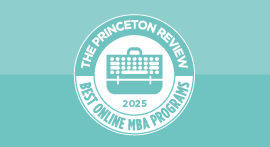Prospective business students know that MBAs are expensive undertakings: an article from U.S. News estimates that highly-ranked MBA programs can cost more than $50,000 per year. But although MBA tuitions are high, funding your professional future may not be as daunting as it seems. That’s because, as the same article points out, many business school students receive scholarships and need-based financial aid. In fact, U.S. News reports that Harvard Business school “offers need-based fellowships to nearly 50% of each class."
Read More: Best Online MBA Programs

MBA Financial Aid & Scholarships to Fund Your Future
As you consider which type of MBA program makes the most sense for you, it's also wise to consider what scholarships and financial aid packages are available at each of the schools you're considering. Here are a few tips to get started:
1. What does it cost?
Check tuition estimates listed in our online business school profiles. These resources will give you an idea of what costs you'll need to cover as a business student.
2. What kind of b-school aid is available?
Figure out whether or not the schools you're interested in give need-based fellowships or grants (which do not need to be repaid) as well as what calculations they use to determine need. Research these schools online or call their financial aid offices directly if you have specific questions. At the same time, check out any merit-based scholarships, which are generally awarded to students based on previous education achievements, high GMAT or GRE scores, or specific backgrounds or career plans.
Read More: How to Find Affordable MBA Options
3. Research industry scholarships.
These are not awarded by MBA programs themselves, but rather by third-party organizations that sponsor business students who plan to work in specific fields. There are also programs run by organizations like the National Black MBA Association, the National Society of Hispanic MBAs, and the Forte Foundation, which help minority and women students pay for their MBA degrees.
4. Look into federal student loan programs for U.S. students.
Check options like Stafford loans and GRAD Plus loans, as well as private student loans. Note that planning to pay back borrowed money with interest makes it clear to business schools that you are making an investment in your education; make sure you’ve calculated your MBA return on investment if you decide to borrow money. Know, however, that loans (both public and private) are a common way for business students to pay for MBA degrees.
Practice for the GMAT
Take a GMAT practice test with us under the same conditions as the real thing. You'll get a personalized score report highlighting your strengths and areas of improvement.
Read More

Find MBA Programs Matched to Your Interests
Explore our featured business schools to find those that are looking for students like you.

Top Online MBA Programs
On a mission to increase your salary? Our Top 50 Online MBA ranking is based on academics, career outcomes, tech platforms, and more.

Best Career Prospects
Find out which schools have the best track records for getting students jobs—and the highest starting salaries.

Top Schools for Entrepreneurship
Ready to build your own business from the ground up? Check out these 50 graduate programs.